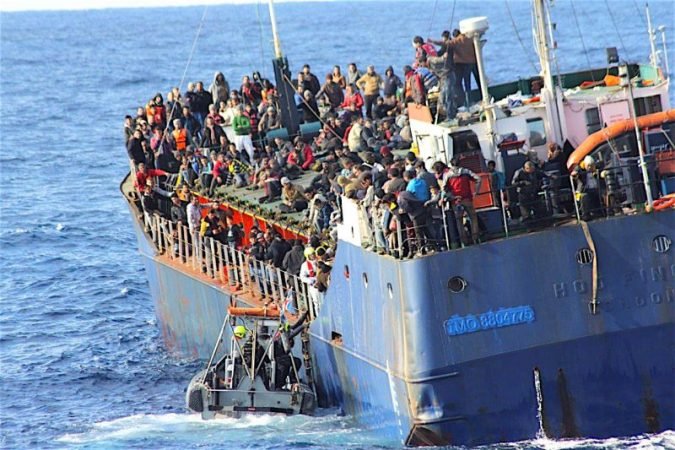The New EU Migration Policy: The weapon to fame or shame?

European Commission President Ursula von der Leyen after the press conference on the New Pact for Migration and Asylum told reporters in Brussels that the “New Pact for Migration and Asylum” offers Europe “a fresh start.”
“We want to live up to our values and at the same time face the challenges of a globalised world,” she said.
As migration and the relocation of people has always been a thorny subject to deal with, in the world’s biggest trading bloc’s fabric many feuds have caused bad blood between the Mediterranean-shore countries where they mainly arrive. the reluctant and the richer Eastern and northern states respectively are the places where many of the new arrivals aspire to live.
In 2015, more than a million people made it to European Union shores, overwhelming security and welfare networks, and fomenting far-right sentiment.
Hungary and Poland launched a legal challenge against a failed EU scheme for mandatory migrant quotas set up in haste after the 2015 influx.

The arguments tend to be serious as the entry of unauthorized migrants in the Union have also been making significant differences in recent years. Some 140,000 people arrived last year, compared to around 2 million migrants who entered legally, the European Commission says. Turkey, Lebanon and Jordan have had to cater to far more.
“Migration is complex, the old system to deal with it in Europe no longer works,” said von der Leyen.
In 2015, the EU’s inability to manage an influx of refugees brought states to the brink of collapse and tested adherence to common rules that are meant to bind member states together, amid a revolt against demands to share the burden. Today, the issue constrains the EU’s handling in foreign policy and gives unwelcome ammunition to Turkey, upon which the EU relies to stem migration flows.
In its proposals unveiled on Wednesday, the European Commission said asylum applications should be processed within 12 weeks. The EU hopes to reach a political agreement on the plans by the end of the year.
The Dublin regulations were scratched as the notion of the first country of arrival to be responsible for the asylum requests have been putting too much pressure on the Mediterranean Nations. Those arriving, under the new proposal would be assigned to countries based on family links, history of education or work, or whether they have a Visa issued by a member state.
“We need these people because we are an ageing society” said European Commissioner for Home Affairs Ylva Johansson.

Key points in the proposal
Members of the EU can opt out of taking in some refugees and help ease the load on countries that see the most migrant arrivals by sea by providing other material and logistical support.
Those not willing, could take charge of deporting people whose applications are refused. This option might suit Austria, the Czech Republic, Hungary, Poland and Slovakia, who are completely reluctant in case of accepting refugees.
The asylum applications in countries such as Tunisia or Morocco, where the positive response rate is lower than 20 percent will process the migrant applications at the border and within 12 weeks.
While the European Commission’s plan included receiving a galore of criticisms from countries who would prefer to talk about tightening borders and asylum laws, it won early approval from Malta.
“Returning those with no right to asylum is crucial. Agree that solidarity must not be optional,” said the Maltese Prime Minister Robert Abela.
The new pact, which has been pushed most strongly by German Chancellor Angela Merkel, proposes a “fair sharing of responsibility and solidarity between member states while providing certainty for individual applicants”. There would be:
- New compulsory pre-entry screening involves health, identity and security checks
- A faster asylum border process involving decisions within 12 weeks and swift returns for failed applicants
- The EU’s 27 countries would have “flexible options” for how to take part, so countries such as Hungary and Poland that have refused to take in arrivals in the past would be asked to help in different ways.
Taking in recent arrivals
- “Sponsoring” returns – ensuring on behalf of other states that people refused asylum are sent back
- Providing immediate operational support
- Each state would be legally required to contribute their “fair share” – based half on GDP, and half on population size.
The European Commission president said the new pact would “rebuild trust between member states” and strike the “right balance between solidarity and responsibility”.
What is ‘Mandatory Solidarity Mechanism’ and why does it keep Eastern Europe angry?
The European Commission, has put forward a “Mandatory Solidarity Mechanism” to spread the burden of the migrant crisis across all member-states. The “so-called ‘Mandatory Solidarity Mechanism’ will oblige each member state to accept a number of refugees in return for a reported €10,000 (£9,200; $11,750) per adult and €12,000 for an unaccompanied child,” and that “EU states that fail to honour the pact could face court proceedings and large fines.”
Previous attempts to impose mandatory migrant redistribution quotas on all EU member-states have foundered on the point-blank refusal of national conservative or populist governments, particularly in Poland and Hungary, to submit to them.
The position of countries like Poland and Hungary is that they did not support German leader Angela Merkel’s decision to, in effect, open the EU’s borders to illegal mass migration unilaterally in 2015 and that they should not be expected to bear the consequences of a policy they never supported now that Germany and its allies no longer wish to accept migrants with “no limit”, stranding many in border states — particularly Greece and Italy.
The new “mandatory solidarity” policy, at least on paper, seeks to build consensus by allowing governments which do not wish to take illegal migrants to instead pay for their return.

Returning migrants who can’t get asylum
The 450-page proposals spanning five different pan-EU laws put emphasis on sending back the applicants, those who fail to attain successful asylum.
Intended to be in place from 2023, the plan also aims to open more legal routes for migrants, and work better with countries hosting and managing people before they reach Europe.
It would also put EU countries with external borders under closer monitoring to stop illegal pushing back of people after reports of such action by Hungary, Croatia, Greece and Malta.
If, however, a country were falling under major pressure, it could seek to activate a crisis mechanism under which its EU peers would be obliged to take people in or send them back.
Commitments to return migrants who are unable to win asylum that fail to materialise in eight months – which national migration experts and some EU officials admit is tight – would transform into a relocation obligation, anathema to the reluctant easterners.
‘Mandatory relocation’
“Bottom line for us is that we might, and very probably will end up with mandatory relocation,” said a senior diplomat from one of the eastern EU countries. “That is a no go for us.”
The proposal follows a devastating fire earlier this month at the overcrowded Moria camp for migrants on the Greek island of Lesbos that left thousands homeless and brought back criticism of the EU’s delayed decision-making on migration.
“Moria is a stark reminder that the clock has run out on how long we can live in a house half-built,” added Vice-President for Promoting our European Way of Life, Margaritis Schinas.
“No one member state experiences migration in the same way and the different and unique challenges faced by all deserve to be recognised, acknowledged and addressed,” Schinas added.
That means the proposal faces an uphill battle despite having German Chancellor Angela Merkel’s backing. Merkel suffered electoral setbacks after opening Germany to Syrian refugees back in 2015. But in a sign of changing mood, German mayors now offered to take in refugees from the Greek fire eruption incident in a refugee camp in Moria. The pro-Merkel protesters even chanted: “We have space!”
Johansson said that “what we are proposing today will build a long-term migration policy that can translate European values into practical management”, and added that the set of proposals “will mean clear, fair and faster border procedures so that people do not have to wait in limbo”.
“It means enhanced cooperation with third countries for fast returns, more legal pathways and strong actions to fight human smugglers. Fundamentally, it protects the right to seek asylum,” she added.

Criticisms
Hungarian government have clearly stated that they are not interested in the new policy, and have implicitly criticised the EU establishment in Brussels for its failure to emphasise strong border controls.
“Since 2015, the stance of the Hungarian government on migration has been clear and unchanged… We believe that the European Union and its member-states must cooperate in keeping the looming migration pressure outside our borders,” the statement said, emphasising the importance of making arrangements with countries outside the bloc to stop migrants travelling to the EU illegally in the first place.
“While Hungary does not support obligatory distribution, it does defend joint borders, and we expect to receive the same amount of support as other Schengen states protecting those external borders,” they added firmly.
“We would like to remind everyone that since the 2015 migration crisis, the Hungarian government has spent more than 1 billion euros on protecting the borders of Hungary and the European Union, without a single cent of contribution from Brussels.”


















